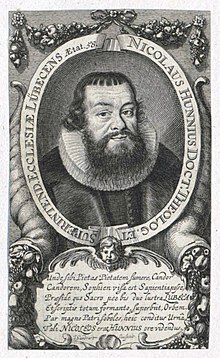This article includes a list of references, related reading, or external links, but its sources remain unclear because it lacks inline citations. (May 2014) |

Nicolaus Hunnius (11 July 1585 – 12 April 1643) was an orthodox Lutheran theologian of the Lutheran scholastic tradition.
Hunnius was born at Marburg, the third son of Egidius Hunnius. At the age of fifteen he entered the University of Wittenberg, where he studied philology, philosophy, and theology. In 1609 he joined the philosophical faculty and lectured in philosophy and theology. He followed the same theological direction as his father, inherited his temper and talent as a polemist, and was like him, possessed of great learning. In virtue of his ability Elector John George I. of Saxony appointed him, in 1612, superintendent of Eilenburg, where he won the respect of his superiors and the affection of his congregation. In 1617 Hunnius was called to succeed Leonhard Hutter, at Wittenberg, as professor of theology. In 1623 he was appointed pastor of St. Mary's Church at Lübeck; the following year he became superintendent. For the suppression of the enthusiasts who pervaded the region, Hunnius reunited the dioceses of Lübeck, Hamburg, and Lüneburg (Ministrium tripolitanum), and at a convention held in 1633 at Mölln measures were proposed and adopted for the same purpose. For the suppression of the adherents of Calvinism Hunnius frustrated the efforts of John Durie, who tried to establish harmony between the Lutherans and the Reformed. To check the proselytizing tendencies of the Roman Catholics, he even invoked the aid of the secular powers. At the same time he made earnest efforts to elevate the religious and ecclesiastical life. He died at Lübeck, aged 57.
